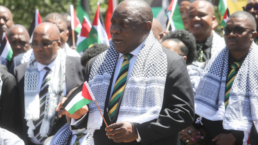Though the hearing in the ICJ is likely to take years to finally resolve, South Africa has, nevertheless, called for the world court to convene in the next few days to issue “provisional measures” which are essentially calling for a ceasefire.
By Mohamed Hanipa Maidin, Green Left
South Africa instituted proceedings against Israel before the International Court of Justice (ICJ) on December 29, on the grounds that Israel has allegedly violated its obligations under the Convention on the Prevention and Punishment of the Crime of Genocide (the “Genocide Convention”) in relation to Palestinians in the Gaza Strip.

In instituting its action against Israel before the ICJ, South Africa seeks to found the Court’s jurisdiction on Article 36, paragraph 1, of the Statute of the Court and on Article IX of the Genocide Convention, to which South Africa and Israel are parties.
Apparently Article IX of the Genocide Convention confers jurisdiction on the ICJ to hear “Disputes between the Contracting Parties [in this case Israel and South Africa] relating to the interpretation, application or fulfillment of the present [Genocide] Convention, including those relating to the responsibility of a State for genocide or for any of the other acts enumerated in article III.”
The ICJ previously ruled that Gambia could bring a genocide claim against Myanmar — both are the contracting parties under the Genocide Convention. In its landmark ruling, the ICJ also invoked erga omnes obligation and erga omnes partes right (obligations and rights towards all) under the Genocide Convention to protect the Rohingyas against genocide.
Recent Posts
‘Unconstitutional. Unethical. Authoritarian.’ ICE Bars Millions Of Immigrants From Bond Hearings
July 18, 2025
Take Action Now One watchdog said the new policy “seems like a blatant attempt to stop them from exercising their right to due process.”……
Americans Are Not Nearly Alarmed Enough About Climate Change
July 18, 2025
Take Action Now Americans still don’t comprehend how imminent, dangerous, and far-reaching the threat is—and journalists are partly to blame.By…
The IRS Is Building A Vast System To Share Millions Of Taxpayers’ Data With ICE
July 17, 2025
Take Action Now ProPublica has obtained the blueprint for the Trump administration’s unprecedented plan to turn over IRS records to Homeland Security…
Israel’s Sudden Assault On Syria Is Unchecked Aggression
July 17, 2025
Take Action Now Jerusalem is bombing Damascus and threatening al-Sharaa’s rule, while Washington was hoping to help the nascent government on…




